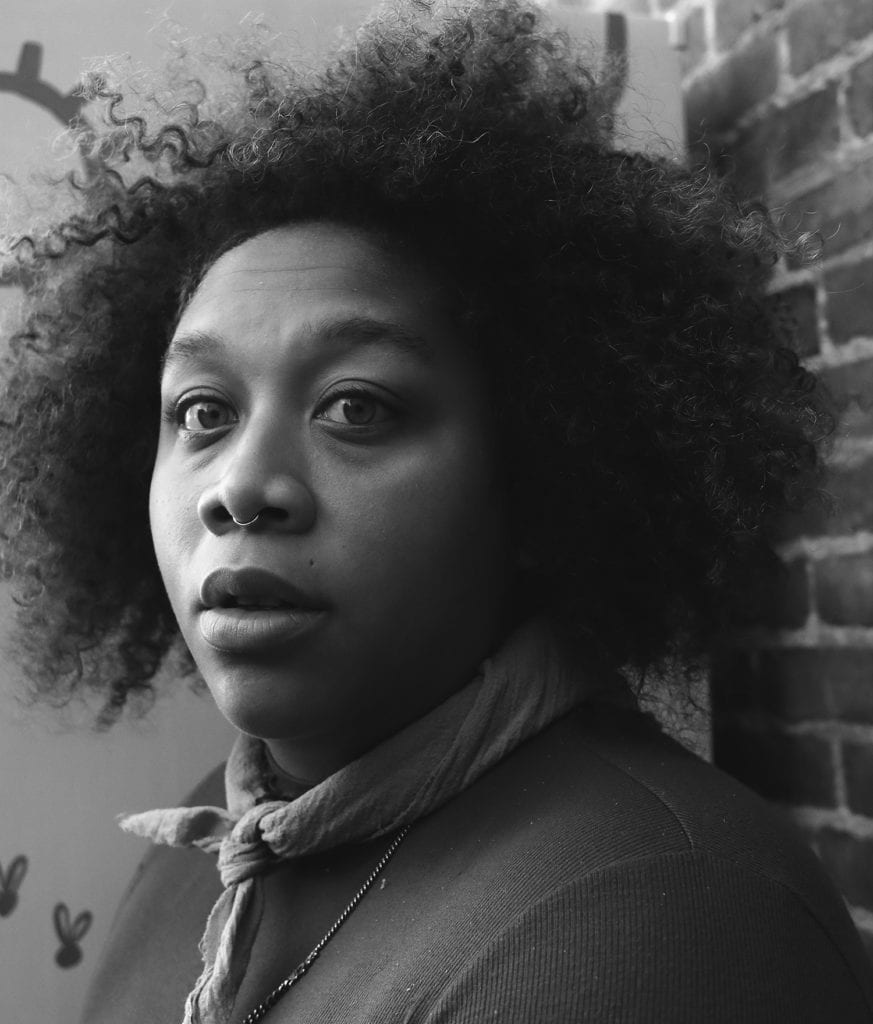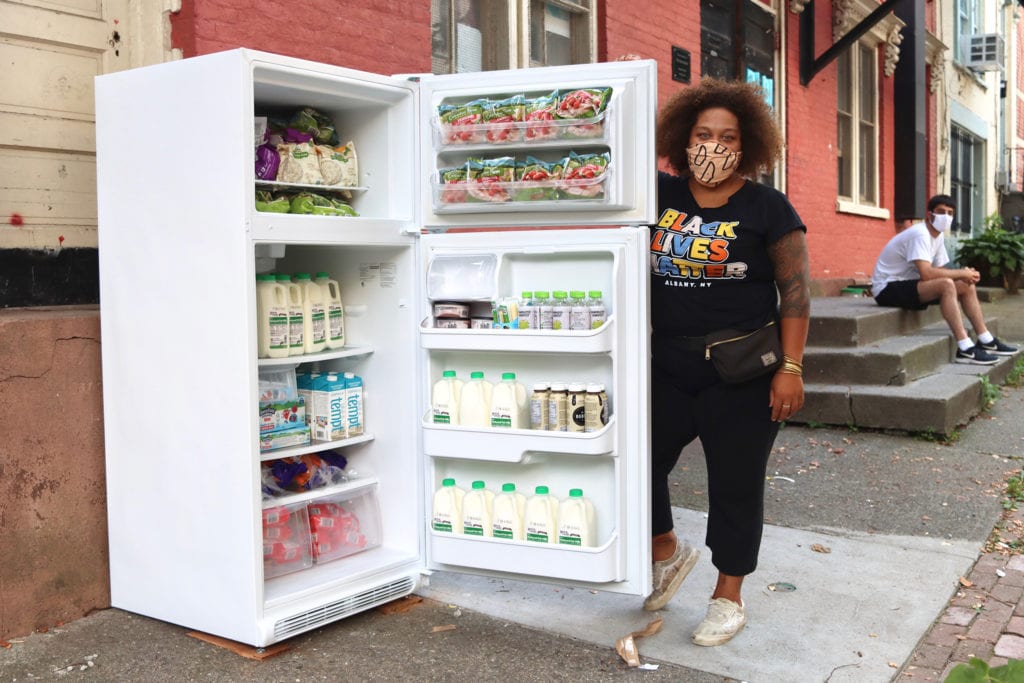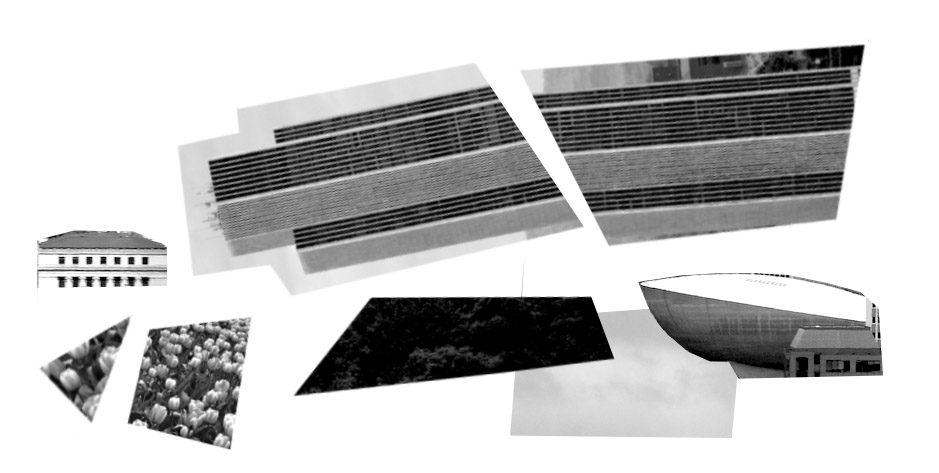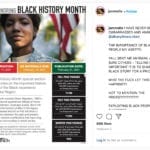
Earlier this month Jammella Anderson was among those who received an email from the Times Union soliciting an ad package in the paper’s Black History Month section. She shared screenshots of the email on her Facebook and Instagram accounts, with captions expressing her disappointment with the paper’s actions. Within a week the online response to Anderson’s social media posts had prompted an open letter from George R. Hearst III, Times Union publisher and CEO, addressing the backlash. The section ran this past weekend with ads only from Price Chopper, Army National Guard, and two labor unions.
Anderson spoke to Albany Proper about her views on the commercialization of Black History Month through the Times Union’s actions.
// I figure the easiest thing to start is to have you give me the rundown of what happened.
So I got an email from the Times Union. Because it’s Black History Month, a lot of places have reached out to me, talking about the Free Food Fridges and just what I’ve been doing, especially being a Black woman. I assumed it was a part of that.
So I’m reading, reading, reading… It’s basically talking about amplifying Black voices and the same rigamarole that everybody gets. I go to the next page and it’s the breakdown of prices for advertising. They’re soliciting Black people and businesses to take out ads in that paper for Black History Month.
I read that and I was like there’s no way they did that. I posted it online immediately and all hell broke loose. People were so angry. Hundreds of people commented. Hundreds of people re-shared it, tagged the Times Union.
A bunch of people reached out to me and said that they also got solicited. I couldn’t believe that something like that could go through so many levels of people. Someone was like, “Yeah, that’s a good idea.” They weren’t even paying attention to who they were sending it to, you know? They just didn’t try. They just really missed the mark, especially right now.
View this post on Instagram
// Why was the email you received wrong in your eyes?
When we’re in the paper, we’re in the news for things that are wrong, things that are crimes. We want to amplify our voices. But historically that paper has shown Black people in a negative way. Or it’s the come up story – your life was so hard and so bad… Black people are not a monolith. There are different things we do and places we come from.
Because of systemic oppression there is a difference in the way we’re treated. With something like the (Times Union), we need them to be able to step up and to amplify our voices in a way that showcases all of us, not a monolith. We need the paper to be providing a resource.
All the mutual aid efforts going on around Albany… It’s from people like me who are like wow, there is a direct need in these communities. We need to help. How can we leverage our resources? That’s straight up what’s going on. To tie that all back to the paper – to make us pay to put that out there is insane, especially when a lot of these organizations are grassroots organizations. They don’t have enough funding. They don’t have the proper resources.
So why would I use funds that could feed people, you know? Why would I give that money to a paper who is not going to paint me in the best light?
// On February 10, the Times Union posted an open letter responding to the negative feedback over the solicitation email. Who do you think that statement was for?
It was for themselves. That’s who that was for. They needed to respond. They understand how social media works.
// Would you call it an apology?
Absolutely not.
It’s like when you’re learning how to apologize as a kid. If a child had written that, they would be corrected. It was very I’m sorry that you feel this way. There was no accountability for their actions. Their action was very harmful. That was a very harmful thing – your voice is only important if you pay for it.
They’re just cosigning all the bad behaviors they’ve always had. The apology even had something about… They were like oh, we did these articles on Black people. So yeah, good job. Pat on the back. You did two articles on Black people. But we should be on the front page all the time.
I guarantee I am a large part of why they did an apology, but I also know it’s because of the white people who wrote in. People were mad. People were freaking mad.
// Why is that important?
Black people are not surprised by this stuff. With anything, white people are going to listen to white people, especially people in power. They’re going to listen to the people who look like them. They don’t listen to us the same way.
Having white people stand up so that we don’t have to do the emotional labor is really important. Me, I do that emotional labor because I want to, but it’s fucking exhausting. It’s important that when this stuff happens that white people are standing up. Not speaking for us, but speaking on our behalf and speaking in a way that is amplifying our feelings and our emotions.
// What do you think the Times Union could do better going forward?
I don’t know. This one’s really hard.
We need to stop handing over the microphone to Black people to shut them up. Having a section for Black History Month… It’s almost like OK, we gave you the bone so you can quiet down for a little bit now. That’s what that is when they do that.
I got sought out to be on a committee at the Times Union. It was basically an antiracism committee. They wanted people who are leaders in the community to help with things like this. But we don’t really have a pull or a say, you know?

// Also that’s asking you to work for free. Maybe they should be investing in that?
Exactly. I asked them if we would be getting paid. They said well, we’ll figure out what that looks like. Which means no, we’re not getting paid. I just don’t believe that. I just don’t.
We need people who look like us to be the ones writing, to be the ones interviewing. Hiring people and seeking people out and paying them. They were talking about giving money to grassroots and nonprofits. Who’s the deciding factor for where money goes?
// That’s something I wanted to ask about. In the open letter it says proceeds from the Times Union’s Black History Month section will be donated to “nonprofits that are active in the Black community.” So something like the Free Food Fridge, as a grassroots operation, wouldn’t be included there. Also it’s not saying local. There’s no promise that it’s going to go back into the Capital Region.
Also it’s not saying that it has to be a Black-owned place. That’s the other thing. They’re saying they’re working with the Black community.
// What do you think about that?
It’s the “my Black friend” thing. That’s what it is to me. “Oh, well we do this already.” “Oh, we’ve done that.”
I think nonprofits are great. They’re really wonderful. Eventually I will become a nonprofit. I could have done it a lot sooner. I just… Why do I have to prove to anybody why my organization is worthy of your money? It’s changing the narrative around giving. You can just give money and not have a say in what happens with it, which is essentially why I did all of the fundraising I’ve done.
I don’t think it’s fair to have white people in general deciding on what Black organization is doing good enough and who gets the money. Every Black organization is doing good, because every time a white organization doesn’t help us we just start our own. That’s how we see change. That’s how we move forward. I don’t want to sit at your table. I want to build my own table and I’m going to sit right at the head of it and that’s it.

